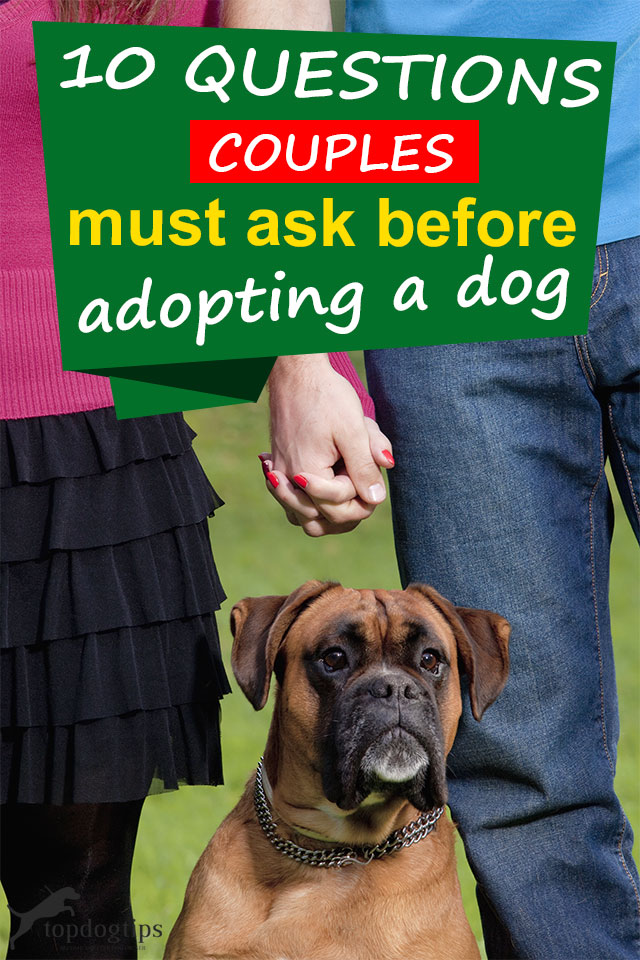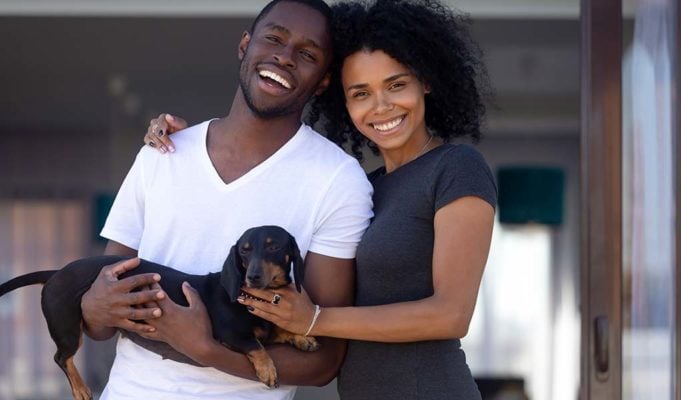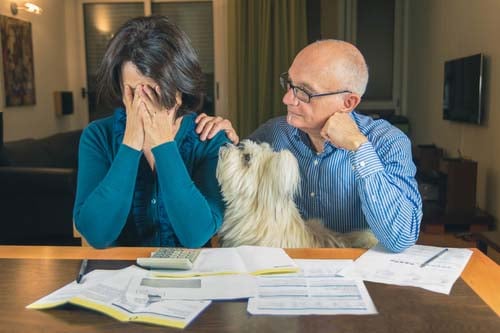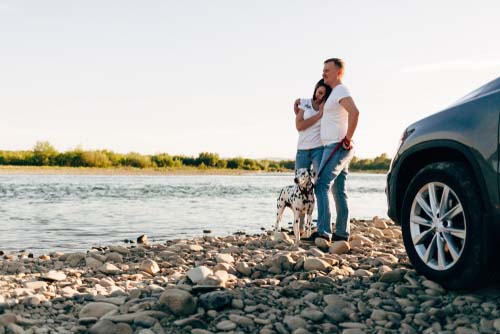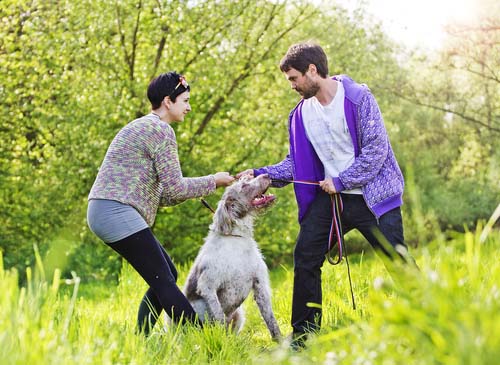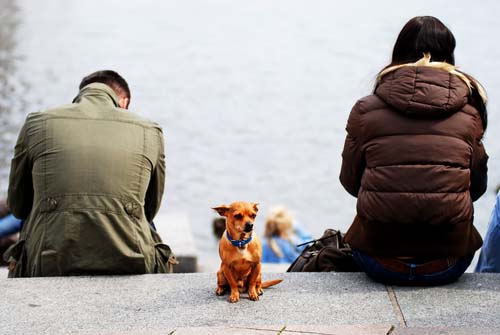Adopting a dog is a big commitment, and even more so when doing that as a couple. To ensure the pup doesn't end up back at the shelter, it's important not to make a hasty decision and make sure you're both on the same page. While there are many benefits to adopting a dog as a couple that can improve your relationship, there are some things to consider before taking this step.
1. Where will our relationship be 5-10 years down the road?
The first question you need to discuss with your partner before you adopt a dog involves how serious your relationship is with your current partner. Do you and your partner see a bright future together? Dogs are often a commitment that lasts anywhere from ten to fifteen years.
Breakups aren’t only hard for people – they are also hard for the pets involved. Your dog will be emotionally attached to both of you, and not seeing his other owner will cause him stress. Then there's also a question, who keeps the pet after a breakup? So if you expect a possible breakup or if your relationship is “on the rocks”, it may not be the best time to adopt a dog together right now.
2. Can our finances cover the extra costs of caring for a dog?
When you adopt a dog, you add another family member that needs shelter, water, and food, as well as vet check-ups and vaccinations among other costs. The lowest annual cost after the first year for the basic necessities of a dog is about $326.
What isn’t included in the annual dog cost is pet emergencies that may include a dog eating something dangerous and requiring an expensive surgery. The cost of diseases or illnesses that may need treatment is also not included in the general annual cost of caring for adopted dogs, so you need an emergency savings account for that.
Another factor not included in the annual pet cost is grooming. How often your dog must be groomed will depend on what type of dog you and your partner decide to adopt. Then there's a need for dog training which also costs quite a bit, as well as any additional pet care help you two may require (e.g. hiring a pet sitter or using a boarding facility).
There are many costs that come with giving your adopted dog the best lifelong care. You and your partner need to be open and comfortable with talking about your financial situation before adopting. Make a written plan together on how you will pay for the care of the dog, and who's going to pay for what, or how the funds will be used.
3. Are there any pet restrictions where we currently live?
Where do you and your partner currently live? Do you own or rent your home? Do you and your partner live alone or with other people? More than likely, if you and your partner own your home you know what restrictions your home has as far as pets go.
The same is true if you live in a neighborhood that is under a Homeowners Association. Many times the neighborhood homeowners association will have rules in regards to the type of dogs allowed.
If you're renting or leasing a home or apartment, you two should discuss pet adoption with your landlord and check signed an agreement on pet policy. Some rental homes do not allow any dogs or certain breeds, and some landlords can be particularly difficult. There may be some breed, size, or weight restrictions as well as a pet deposit or monthly pet fee.
4. Do our current residents or common guests have pet allergies?
One of the top reasons dogs are rehomed is due to newly discovered pet allergies. You or your partner may not know it yet but have allergies. Children who are already in the picture, or may eventually be in the picture, may also get allergies to a dog. Other family members who may come and visit you on a regular basis may be allergic.
5. What major life events do we see together in the future?
Major life changes are part of life. Do you and your significant other have any life-changing events you are planning for in the future? This can be having children, moving into a new home, or starting a new career. Each of these will change your daily routine. During these changes, can you and your partner still care for your adopted dog properly?
When, or if, you have children, will you have the resources to make sure your home is safe for the baby and the dog? If you and your partner plan on moving down the road or across the country, will you be able to take your pet with you?
Will a new career affect the amount of time you have to spend with your dog? If so, can you accommodate your dog by still finding a way to give them the proper care and time that a dog needs?
6. Do our schedules allow the time needed to care for a dog?
Adopting a pet involves you and your new family member learning about life together. For your dog, it also involves learning how to live life outside of a shelter. Following a consistent routine will be important for your dog in order for them to learn the ropes of living in your home with you.
Make sure your daily life schedule (work, school, and other routine activities) has enough room to make sure your dog gets the time they need with you and your partner as well. It’s important that the dog you adopted together has time to bond with the both of you.
7. What rules should we set in the home?
Talk to your partner about the rules you should set for your home and your new addition. Write a list that both you and your partner agree on that covers several different areas.
You’ll want to make sure that both of you agree what your dog can and cannot do in the house. Will your dog be allowed to sleep on the bed with the two of you? Are you going to allow your pooch on the furniture in the home?
Your partner and you also need to set rules on where your dog is and is not allowed in the home. If your partner has an office, they may not want the dog in there unsupervised or at all. Parameters should be set before the dog comes home.
8. How will we share the responsibility of dog care?
Dog adoption is likely to affect your relationship in many ways. One of those changes is a new need to share responsibility: who will help potty train the dog? Who's taking the dog out and when? There's a lot to do here: housebreaking, feeding, grooming, bathroom accidents, vet checkups, teeth brushing, bathing, etc.
If the dog requires professional training, who will make sure the dog attends training? Will you share the responsibility of making sure your dog gets to their training lessons? Discuss with your significant other all of these tasks beforehand so you're both on the same page.
9. Who will care for our dog if we're away or during an emergency?
As a couple, there will be plenty of times you will want to take off and enjoy time away from home with a vacation. There will also be plenty of times where emergencies happen and you may have to leave your home at the drop of a hat.
Adopting a dog as a couple will change your life together, and your planning. It isn’t always possible for two of you to take the dog with you in certain situations. Create a plan with your partner and discuss who will care for your dog while you are away.
Do you have a family member or friend who can invite your dog into their home while you are away? You may have a family member who can come and care for your dog at your home while you are away.
If you do not have any local family or friends you can reach out to a local pet sitting agency or independent dog walker to care for your dog while you are away. Boarding facilities are another way to keep your dog under a watchful eye while you are away.
10. Are there any requirements when it comes to what kind of dog?
Adopted dogs come in different shapes, sizes, ages, and temperaments. Talk with your partner and discover which dog matches both of your needs, desires, activities, personalities and living situation the best.
Larger breeds tend to cost more to care for. This is because the resources needed to care for them are larger and used more frequently to provide adequate care. Flea and tick preventative, for example, is based on the weight of a dog. The more the dog weighs, the more expensive the prevention will be.Dogs with more hair, large or small, will require more routine grooming. Many dogs will need help from a professional dog groomer at least on a monthly basis.
Discuss what age range you would like your adopted do to fall into. Most puppies will require more initial investment in time, money, and mess clean up. This can also be true of adopted dogs that are older.
Take Home Message
Adopting a dog as a couple is a commitment that can last well over 10 years. Pet adoption can either benefit your relationship, or break it up if not planned for. Discuss all issues that may arise during your life together. Find out how these issues may affect how well you are able to care for your adopted dog together.
Make sure that you and your partner are comfortable enough together to discuss future plans, emergency plans, and finances. The most important thing is to make sure that everyone in the household is on the same page. This will ensure that your new dog and your family will have a smooth transition together.
READ NEXT: 50 Dog Adoption Questions Shelters Ask
Want To Share This?
